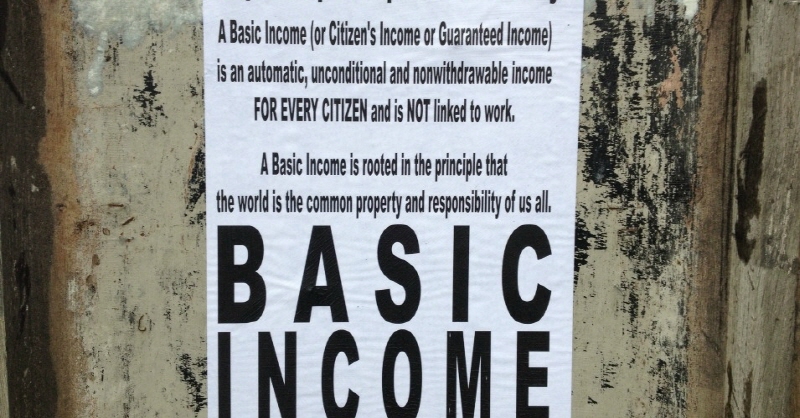
As the number of unemployed increases due to Corona 19, interest in basic income, which unconditionally and uniformly pays a certain amount as part of economic policy, is increasing. The British Welfare Policy Transfer State, written by historian Peter Sloman, examines the history of basic income in the United States and Britain to this day.
After the corona 19 epidemic, voices demanding the implementation of basic income are rising around the world. In April 2020, celebrities such as Alexandria Ocasio-Cortez, the youngest female legislator in U.S. history, and Jim O’Neill, an economist, renowned for inventing the concept of BRICs = Brazil, Russia, India, China, dominate. He appealed for the realization of basic income.
O’Neill said that among the policies that came out during the global financial crisis around 2008, policies such as lowering interest rates had only a small effect on the economy. Insisted. In fact, the Spanish government has announced that it is trying to realize a basic income during the corona 19 outbreak.
Although it is a basic income that has attracted attention recently, it was a concept that did not even exist in the world airport era around 1930. Treasury Secretary Andrew Mellon, who represented the right at the time, said that workers, stocks, farmers, and real estate should be liquidated. If corruption is eliminated in the old system, prices will be appropriate and new entrepreneurs will start rebuilding. Insisting on the selection of the weak. The left appealed for comprehensive welfare policies such as public work, job security, and social security for reconstruction, but the idea of cash payment such as basic income did not come up.
According to Peter Sroman, the origin of the modern basic income was that all individuals advocated by Quaker engineers Dennis Miller and Lobel Miller in 1918 should always receive a payment from the central fund sufficient to maintain their new name and freedom. . However, this claim was not accepted by the majority at the time.
It was John Maynard Keynes, who is called the best economist of the 20th century, who really pushed the debate on efficient wealth redistribution. Keynes and Thomas Humphrey Marshall pursued a socialist approach that governments should provide services that would improve working class living standards, such as education, medical care, and school meals. Later, with William Beveridge’s release of the Beveridge Report on social insurance-related services, Britain began to walk the path of a welfare state known as from the cradle to the grave.
On the other hand, the idea of being the prototype of basic income that cash should be paid rather than providing social welfare services appeared in the 1940s. Juliet Rhys-Williams is a representative figure who promoted the idea of redistribution of wealth in the 1940s. A novelist and politician, she advocated a negative income tax, where people without a certain income pay taxes to the government and vice versa. James Edward Meade, who represented the Keynesian School and later won the Nobel Prize in Economics, also advocated cash payments in a 1948 presentation. However, this claim was not accepted by people at the time.
American economist Milton Friedman, while working for the U.S. Treasury from 1941 to 1943, argued that a wealth tax should be introduced as an alternative to all other welfare programs. Friedeman’s argument could be said to be an attractive alternative to socialist policy.
In the 1950s and 1960s, political parties that both supported the laissez-faire approach and those that supported the Keynesian approach that emphasized investment in social infrastructure and public works according to the principle of effective demand reached its peak. Was. In the United States, President Lyndon Johnson has proposed a series of social welfare policies called War on Poverty since 1964.
Meanwhile, the British implemented a series of economic policies called Thatcherism under the Margaret Thatcher garden in the 1970s, but the gap between rich and poor expanded and the unemployment rate rose. However, as a result of the active subsidy movement in the midst of the economic crisis, discussions have arisen to approach the idea of basic income.
In the 1990s, Prime Minister Tony Blair implemented various policies with the aim of combining the merits of conflicting ideas, such as capitalism and socialism, of the Third Way. Under Thatcher and his successor, John Major’s regime, the disbanded welfare state model aimed at a transition to equal opportunity. The Labor Party, led by Blair, focused on redistributing funds and resources and increasing welfare benefits to rebuild schools and hospitals that were abused in the Thatcher era, reduce military spending, and increase economic spending.
In the 2010s, Prime Minister Cameron began moving toward a small government by implementing a six-year austerity financing. On the surface, the movement was moving away from basic income, but policies such as tax credits have been continuing since the Blair regime. .
In this way, ideas that are close to modern basic income have emerged from all over the era. However, for political and social reasons, it could not be realized. Due to the nature of social distancing from basic income under the Corona 19 epidemic, large-scale public projects may be impractical. However, as medical equipment and skilled workers are becoming scarce, there is a possibility that the demand for the production of necessities is rather increasing, and basic income cannot be solved. 19 It is pointed out that this is not a policy. As an alternative, there are opinions that the temporary unemployment benefit should be raised to 90% of the general benefit to increase spending on the lowest income bracket in the midst of COVID-19. Related information can be found here .


















Add comment